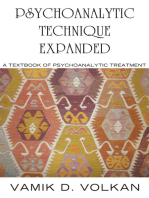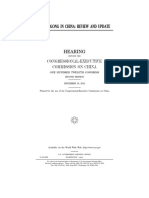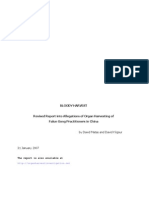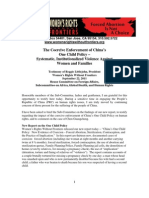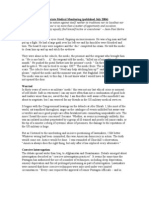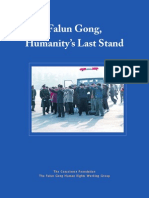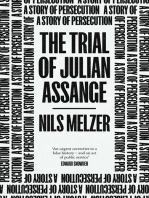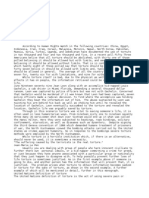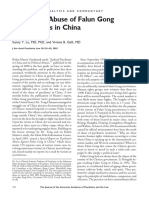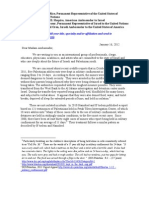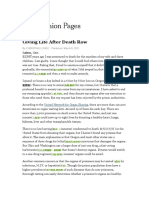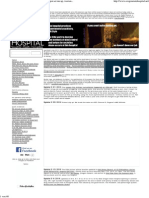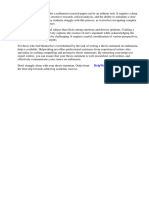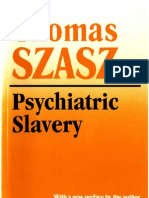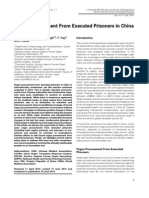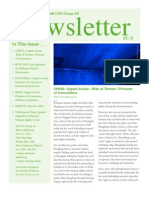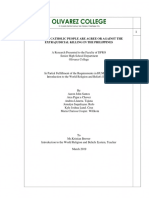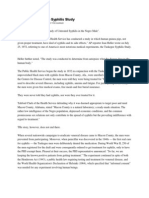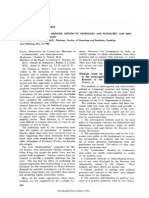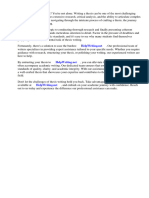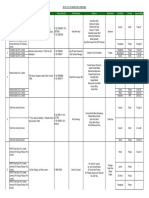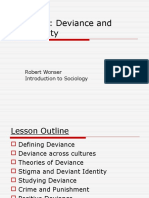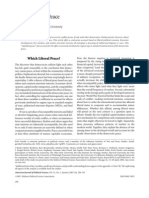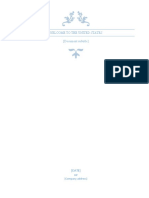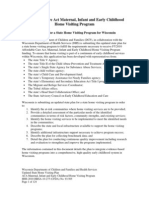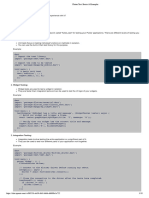Congressional Testimony: Organ Harvesting of Religious and Political Dissidents by The Chinese Communist Party
Congressional Testimony: Organ Harvesting of Religious and Political Dissidents by The Chinese Communist Party
Uploaded by
12h31hdCopyright:
Available Formats
Congressional Testimony: Organ Harvesting of Religious and Political Dissidents by The Chinese Communist Party
Congressional Testimony: Organ Harvesting of Religious and Political Dissidents by The Chinese Communist Party
Uploaded by
12h31hdOriginal Title
Copyright
Available Formats
Share this document
Did you find this document useful?
Is this content inappropriate?
Copyright:
Available Formats
Congressional Testimony: Organ Harvesting of Religious and Political Dissidents by The Chinese Communist Party
Congressional Testimony: Organ Harvesting of Religious and Political Dissidents by The Chinese Communist Party
Uploaded by
12h31hdCopyright:
Available Formats
Congressional Testimony
Organ Harvesting of Religious and
Political Dissidents by the Chinese
Communist Party
Ethan Gutmann
Adjunct Fellow
Foundation for Defense of Democracies
Hearing before House Committee on
Foreign Affairs
Subcommittee on Oversight and Investigations
Washington, DC
September 12, 2012
1726 M Street NW ● Suite 700 ● Washington, DC 20036
Ethan Gutmann September 12, 2012
Thank you for inviting me to participate in this profoundly important hearing.
Beginning in 2006, I began conducting comprehensive interviews with medical
professionals, Chinese law enforcement personnel, and over 50 refugees from the Laogai
System, in order to piece together the story of how mass harvesting from prisoners of
conscience evolved in China. Based on my research, the practice began in Xinjiang in
the late 1990s. By 2001 the practice expanded nationwide, with Falun Gong providing a
much larger, and frequently anonymous, pool of potential 'donors.'
Yet my time today is short. I too was skeptical when I began my investigation, as some of
you may be today. So instead of offering my conclusions, I invite you to draw your own
conclusions from my evidence—twelve witnesses, each of whom fills in a critical piece
of the organ harvesting puzzle—before I speculate, briefly, on the implications and the
full human cost. I’ll also touch upon the potential function of the quit-the-CCP movement
I think most people in this room are familiar with Harry Wu’s research. Harvesting
criminals began in the 1980s. By the early 1990s it had become systemic, a practice
involving “organ donation” consent forms and mobile harvesting vans at execution sites.
The donors were criminals. And whether or not the criminals signed the forms under
duress, they had been convicted of capital crimes under Chinese law.
My first witness, Nijat Abdureyimu, special officer, 1st Regiment, Urumqi Public
Security Bureau, doesn’t dispute any of that. But he does note that by 1994, the doctors
doing the harvesting became increasingly uninhibited. That’s when his fellow officer
puzzled over the screams—“like from hell”—that he heard coming from a harvesting
van. Two years later the prison’s medical director confessed to Nijiati that organ
harvesting from living human beings—they would expire during the surgery of course—
was now routine.
My second witness, Dr. Enver Tohti, general surgeon, based in an Urumqi hospital,
recalls an execution ground outside the city in 1995: a prisoner shot in the chest, not to
kill, but to send the body into deep shock, minimizing the squirming and contractions that
could make harvesting problematic. Under his supervisor’s firm direction, Enver
performed a live surgical extraction of the man’s liver and kidneys.
The execution ground was commonly used for political prisoners, and the man had long
hair, rather than a convict’s shaved head. But Enver will not speculate, nor will I: there
are no fully credible allegations of doctors harvesting political or religious prisoners—
who only very rarely can plausibly be sentenced to death under Chinese law—until 1997,
the year of the “Ghulja Incident.”
My third witness, a nurse who worked in a Ghulja hospital, describes a hospital turned
upside down: arrest of any doctor who dared to treat a Uyghur protestor, forced
segregation of Uyghur medical staff, and Chinese doctors administering slow-acting
lethal injections to any Uyghur baby who had the misfortune of being a second child.
Finally, she describes, six months after the Ghulja incident, the case of a 21-year-old
Uyghur protestor, harvested for his kidneys by a Chinese military hospital.
Foundation for Defense of Democracies www.defenddemocracy.org
1
Ethan Gutmann September 12, 2012
That timing jibes with my fourth witness, a young doctor ordered to blood-test prisoners
in the political wing of an Urumqi prison on behalf of six highly placed Party officials in
search of healthy organs. As these political prisoners were not on death row, they
panicked and had to be restrained. Against every fiber of conscience in his being, the
young doctor played his part. “It’s just for your health,” he said, as he drew blood. Six
months later there were six new Party cadres, and the cycle repeated.
The next eight witnesses—Qu Yangyao, Wang Yuzhi, Wang Xiaohua, Jing Tian, Dai
Ying, Fang Siyi, Yu Xinhui, and Liu Guifu—come from different backgrounds and were
held as prisoners in strikingly different facilities throughout the Chinese Laogai System.
Yet all have two things in common: they are all practitioners of Falun Gong, and they
were all given strikingly similar medical exams. The doctor, usually military, drew a
large volume of blood. Then a chest x-ray. Then a urine sample, probing of the abdomen
and, in most cases, a close examination of the corneas. Did the doctor ask any of them to
trace the movement of his light? Did he wiggle his fingers to check the peripheral vision?
No. Only the corneas. Nothing involving brain function, no hammer on the knee, no
lymph nodes, no examination of ears or mouth or genitals—the doctors checked the retail
organs and nothing else.
I defy the Chinese authorities to furnish a plausible medical explanation for such tests. Or
why these tests were given to thousands of Falun Gong men and women—particularly
women, often matched with an individual guard to prevent any disruption. Or why there
were special buses arranged to take away Falun Gong practitioners after extensive blood
testing. Or why, as time progressed, “Eastern Lightning” Christians, or Tibetan activists,
were given the same exams.
I can’t supply a death-count for House Christians, Uyghurs and Tibetans. But I estimate
that 65,000 Falun Gong were murdered for their organs from 2000 to 2008. And given
my time limitations here, I request that you include my recent chapter in State Organs
(which explicitly explains the methodology behind that number) along with two articles,
“China’s Gruesome Organ Harvest,” and “the Xinjiang Procedure,” in the record of
today’s hearings. Anyone who reads this material will quickly grasp the obvious: The
demand for the harvesting of political prisoners came not from triads, but aging party
cadres. China is a surveillance state, aimed at observing party members and the military.
Wang Lijun himself was given an award for medical innovation in organ harvesting. So
“Party Central” knew about this. This was state-run. And any reader will quickly grasp
why the quit-the-party movement cannot be a reform-the-Party movement.
But ultimately, my writing and my testimony cannot do justice to these twelve witnesses.
I cannot replicate the sensation of a guard’s tears falling on my arm as she says that she
“can’t bear to see… a living person about to be wiped out in front of my eyes.” But there
is one more thing that draws all twelve witnesses together: even if I have protected some
of their identities today, I can report—with certainty—that every one of these witnesses
has consented to testify openly before this committee. And if they do, a Taiwanese
Foundation for Defense of Democracies www.defenddemocracy.org
2
Ethan Gutmann September 12, 2012
surgeon who can indisputably verify that Falun Gong organs were being used for his
aging patients is likely to step forward as well.
Testimony by such witnesses takes courage. It carries intense risks for their families.
Shortly after Nijat first consented to an interview with a Swiss paper, his sister, back in
Xinjiang, was arrested for three months. And yet, these witnesses have begun to realize
that there is strength in the collective narrative and in transparency—particularly if the
West, and in particular, the US government, facilitates this transparency. Sadly, no such
support has come forward in the six years since the first allegations surfaced. Much more
evidence has accumulated since that time, but our government has done little. A tragedy
is being played out, even in this hearing today, for in the final analysis, these witnesses
are the men and women who should be sitting in this chair today, not me.
Foundation for Defense of Democracies www.defenddemocracy.org
3
You might also like
- Heather Brunskell-Evans - The Sexualized Body and The Medical Authority of PornographyDocument187 pagesHeather Brunskell-Evans - The Sexualized Body and The Medical Authority of PornographyKalindaMarínNo ratings yet
- Psychoanalytic Technique Expanded: A Textbook on Psychoanalytic TreatmentFrom EverandPsychoanalytic Technique Expanded: A Textbook on Psychoanalytic TreatmentRating: 4 out of 5 stars4/5 (1)
- Action Plan - Gulayan Sa Paaralan - Sir DaleDocument1 pageAction Plan - Gulayan Sa Paaralan - Sir DaleJohn Dale EvangelioNo ratings yet
- House Hearing, 112TH Congress - Falun Gong in China: Review and UpdateDocument122 pagesHouse Hearing, 112TH Congress - Falun Gong in China: Review and UpdateScribd Government DocsNo ratings yet
- Group 48 Newsletter - January 2012Document8 pagesGroup 48 Newsletter - January 2012Joanne LauNo ratings yet
- Bloody Harvest-Falun Gong Organ HarvestingDocument243 pagesBloody Harvest-Falun Gong Organ HarvestingEyemanProphetNo ratings yet
- China Profit$ From Prisoners: Organ Trafficking, Bodies As Commodities, And A Bloody Nation In SilenceFrom EverandChina Profit$ From Prisoners: Organ Trafficking, Bodies As Commodities, And A Bloody Nation In SilenceNo ratings yet
- WOIPFG Investigation of Zheng ShusenDocument2 pagesWOIPFG Investigation of Zheng ShusenHoward39No ratings yet
- House Hearing, 112TH Congress - Examination Into The Abuse and Extralegal Detention of Legal Advocate Chen Guangcheng and His FamilyDocument54 pagesHouse Hearing, 112TH Congress - Examination Into The Abuse and Extralegal Detention of Legal Advocate Chen Guangcheng and His FamilyScribd Government DocsNo ratings yet
- Annotated Bibliography 1Document4 pagesAnnotated Bibliography 1EloiseNo ratings yet
- Bioethics 3-1-11Document23 pagesBioethics 3-1-11rpmfgkbNo ratings yet
- Matching Organs with Donors: Legality and Kinship in TransplantsFrom EverandMatching Organs with Donors: Legality and Kinship in TransplantsNo ratings yet
- Testimony Congressional Little John 9-22-11Document6 pagesTestimony Congressional Little John 9-22-11holyinnocents9594No ratings yet
- Law and the Disordered: An Explanation in Mental Health, Law, and PoliticsFrom EverandLaw and the Disordered: An Explanation in Mental Health, Law, and PoliticsNo ratings yet
- Appropriate Medical MonitoringDocument5 pagesAppropriate Medical MonitoringRobert LeitchNo ratings yet
- The Last Stand HR 2008new1Document60 pagesThe Last Stand HR 2008new1Shizhong ChenNo ratings yet
- RusselDocument3 pagesRusselShaiiNo ratings yet
- A Shocking Discovery: Ivan SemeniukDocument3 pagesA Shocking Discovery: Ivan SemeniukSomeshwar DashNo ratings yet
- The Trial of Julian Assange: A Story of PersecutionFrom EverandThe Trial of Julian Assange: A Story of PersecutionRating: 4.5 out of 5 stars4.5/5 (8)
- Wohan and Corona Virus SecretDocument11 pagesWohan and Corona Virus SecretRoberto AlladoNo ratings yet
- An Essay On TortureDocument5 pagesAn Essay On TortureGrey Fox100% (1)
- Psychiatric Abuse of Falun Gong Practitioners in China: Sunny Y. Lu, MD, PHD, and Viviana B. Galli, MDDocument5 pagesPsychiatric Abuse of Falun Gong Practitioners in China: Sunny Y. Lu, MD, PHD, and Viviana B. Galli, MDBILHÃO KANJISNo ratings yet
- Final Letter W - SignaturesDocument6 pagesFinal Letter W - SignaturesborneaqualblogNo ratings yet
- Group 48 Newsletter - September 2014Document8 pagesGroup 48 Newsletter - September 2014Joanne LauNo ratings yet
- Criminology Australian & New Zealand Journal Of: Police Torture in China and Its Causes: A Review of LiteratureDocument24 pagesCriminology Australian & New Zealand Journal Of: Police Torture in China and Its Causes: A Review of LiteratureAgentia RonetNo ratings yet
- Independent Tribunal Into Forced Organ Harvesting of Prisoners of Conscience in ChinaDocument62 pagesIndependent Tribunal Into Forced Organ Harvesting of Prisoners of Conscience in ChinaDinh TranNo ratings yet
- Giving Life After Death Row: Salem, OreDocument6 pagesGiving Life After Death Row: Salem, OreYu-Chi TsaiNo ratings yet
- Group 48 Newsletter - October 2015Document8 pagesGroup 48 Newsletter - October 2015Joanne LauNo ratings yet
- State Department Report Inaccurate: InaccuraciesDocument20 pagesState Department Report Inaccurate: InaccuraciesAlex LittlefieldNo ratings yet
- One Year After The Nobel Peace Prize Award To Liu Xiaobo: Conditions For Political Prisoners and Prospects For Political ReformDocument126 pagesOne Year After The Nobel Peace Prize Award To Liu Xiaobo: Conditions For Political Prisoners and Prospects For Political ReformScribd Government DocsNo ratings yet
- Strahlenfolter Stalking - TI - The US Department of Justice and The State of Oregon Tortured MeDocument40 pagesStrahlenfolter Stalking - TI - The US Department of Justice and The State of Oregon Tortured MeWirklichkeit-kommtNo ratings yet
- Electronic Torture - JeffPolachek - Study of Bio Ethical Issues - Mind Control Victim TestimonyDocument14 pagesElectronic Torture - JeffPolachek - Study of Bio Ethical Issues - Mind Control Victim Testimonystop-organized-crimeNo ratings yet
- Project On Mercy KillingDocument26 pagesProject On Mercy KillingPranjal SrivastavaNo ratings yet
- Execution IncDocument6 pagesExecution Incag3nt7No ratings yet
- Mind Invasion: The Reality of Voices and the Delusion of PsychiatryFrom EverandMind Invasion: The Reality of Voices and the Delusion of PsychiatryNo ratings yet
- Coercion and Psychiatry PDFDocument3 pagesCoercion and Psychiatry PDFgustavogknNo ratings yet
- House Hearing, 114TH Congress - China's Pervasive Use of TortureDocument114 pagesHouse Hearing, 114TH Congress - China's Pervasive Use of TortureScribd Government DocsNo ratings yet
- Thesis Statement For Euthanasia Research PaperDocument6 pagesThesis Statement For Euthanasia Research Paperjessicacannellamanchester100% (2)
- Henrietta Lacks, Human Research, and The Nuremberg CodeDocument17 pagesHenrietta Lacks, Human Research, and The Nuremberg CodeJonathan BandaNo ratings yet
- Group 48 Newsletter - September 2012Document8 pagesGroup 48 Newsletter - September 2012Joanne LauNo ratings yet
- Trumpet To Conscience PDFDocument16 pagesTrumpet To Conscience PDFHoward39No ratings yet
- Human Rights for the 21st Century: Sovereignty, Civil Society, CultureFrom EverandHuman Rights for the 21st Century: Sovereignty, Civil Society, CultureNo ratings yet
- Imperial Bedlam: Institutions of Madness in Colonial Southwest NigeriaFrom EverandImperial Bedlam: Institutions of Madness in Colonial Southwest NigeriaNo ratings yet
- Szasz Thomas Psychiatric Slavery 1977Document186 pagesSzasz Thomas Psychiatric Slavery 1977terjegutt100% (1)
- Elizabeth Heger Boyle-Female Genital Cutting - Cultural Conflict in The Global Community - The Johns Hopkins University Press (2002)Document206 pagesElizabeth Heger Boyle-Female Genital Cutting - Cultural Conflict in The Global Community - The Johns Hopkins University Press (2002)vlovrincNo ratings yet
- Dr. Tolbert SmallDocument8 pagesDr. Tolbert SmallDaniele CiocciNo ratings yet
- Organ Procurement From Executed Prisoners in ChinaDocument7 pagesOrgan Procurement From Executed Prisoners in ChinaHoward39No ratings yet
- documentsFinderDOC510 ScansBuffalo Chip510.Buffalo - chip.Spring2000.PDF 2Document8 pagesdocumentsFinderDOC510 ScansBuffalo Chip510.Buffalo - chip.Spring2000.PDF 2ruaosman19No ratings yet
- Group 48 Newsletter - October 2014Document8 pagesGroup 48 Newsletter - October 2014Joanne LauNo ratings yet
- Mental Illness and Police Brutality, by Thomas SzaszDocument2 pagesMental Illness and Police Brutality, by Thomas SzaszNicolas MartinNo ratings yet
- Sexual Torture of Men in Croatia and Other Conflict Situations An Open SecretDocument11 pagesSexual Torture of Men in Croatia and Other Conflict Situations An Open SecretMarife CastilloNo ratings yet
- Group 48 Newsletter - May 2010Document10 pagesGroup 48 Newsletter - May 2010Joanne LauNo ratings yet
- Does The Catholic People Are Agree or Against The Extrajudicial Killing in The PhilippinesDocument17 pagesDoes The Catholic People Are Agree or Against The Extrajudicial Killing in The PhilippinesAica ChavezNo ratings yet
- Legacy of Tuskegee Syphilis StudyDocument2 pagesLegacy of Tuskegee Syphilis StudyLcgessamanNo ratings yet
- House Hearing, 114TH Congress - Population Control in China: State-Sponsored Violence Against Women and ChildrenDocument127 pagesHouse Hearing, 114TH Congress - Population Control in China: State-Sponsored Violence Against Women and ChildrenScribd Government DocsNo ratings yet
- Psiquiatria Urrs290Document9 pagesPsiquiatria Urrs290Anonymous JIc7R6No ratings yet
- 12 Hastings Womens LJ 347Document41 pages12 Hastings Womens LJ 347manojkumarsharma7575No ratings yet
- The Motivation and Mental Health of Sex Workers: BrunnerroutledgevsDocument12 pagesThe Motivation and Mental Health of Sex Workers: BrunnerroutledgevsJake HawleyNo ratings yet
- Sample Thesis Statement On EuthanasiaDocument8 pagesSample Thesis Statement On Euthanasiaheidiperrypittsburgh100% (1)
- Thesis Tamil MeaningDocument6 pagesThesis Tamil MeaningHelpMeWriteAnEssayPortSaintLucie100% (2)
- Resume Harith 22.5.21Document1 pageResume Harith 22.5.21harith mustafferNo ratings yet
- 02 Intacc12Document8 pages02 Intacc12pia8mmNo ratings yet
- Course File: Open Source Programming Using PHPDocument7 pagesCourse File: Open Source Programming Using PHPmanjuNo ratings yet
- I Have A Dream - WestlifeDocument2 pagesI Have A Dream - WestlifeSARALA A/P S.K.SUBRAMANYAM MoeNo ratings yet
- Detail of LPG Marketing Companies Dated September 15 2022Document16 pagesDetail of LPG Marketing Companies Dated September 15 2022Irfan KhokharNo ratings yet
- Coding Decoding PDF by Governmentadda PDFDocument52 pagesCoding Decoding PDF by Governmentadda PDFikatal20100% (1)
- Lesson 7 - Deviance and ConformityDocument40 pagesLesson 7 - Deviance and Conformityjcarlaalejo100% (1)
- Interchange by Manufacturer (1 of 5)Document5 pagesInterchange by Manufacturer (1 of 5)javiervbNo ratings yet
- Signs & Symbols - Signs, Symbols, Pictograms & Infographics - Discussion & DownloadsDocument66 pagesSigns & Symbols - Signs, Symbols, Pictograms & Infographics - Discussion & DownloadsLohith Ravi RNo ratings yet
- Assignment Data Warehousing (Ajay - 58)Document10 pagesAssignment Data Warehousing (Ajay - 58)Rushil NagwanNo ratings yet
- Maths Class X Sample Paper Test 08 For Board Exam 2024Document6 pagesMaths Class X Sample Paper Test 08 For Board Exam 2024SowmiyaNo ratings yet
- Originalism Versus Living ConstitutionalismDocument54 pagesOriginalism Versus Living ConstitutionalismKhenz MistalNo ratings yet
- SIEMENS Price List2009Document60 pagesSIEMENS Price List2009Goutam MandalNo ratings yet
- Maya and Her Three Gunas Satva Rajas Tamas Vivek Chudamani Revised FinalDocument24 pagesMaya and Her Three Gunas Satva Rajas Tamas Vivek Chudamani Revised FinalSIXONENINE100% (1)
- Gartzke - The Capitalist PeaceDocument26 pagesGartzke - The Capitalist PeaceMig FlNo ratings yet
- Welcome To The United States (Document Subtitle) : (DATE)Document38 pagesWelcome To The United States (Document Subtitle) : (DATE)Nguyệt TrầnNo ratings yet
- Task 1 Readings in Philippine HistoryDocument2 pagesTask 1 Readings in Philippine HistoryJohn Carlo GustiloNo ratings yet
- Samsung ML-2160 Series PDDocument211 pagesSamsung ML-2160 Series PDAroma Aamir100% (1)
- Wisconsin Dept of Children and Families and Health Services Home Visitation PlanDocument201 pagesWisconsin Dept of Children and Families and Health Services Home Visitation PlanRick ThomaNo ratings yet
- DLL - English 4 - Q2 - W1Document4 pagesDLL - English 4 - Q2 - W1Bessy TarucNo ratings yet
- ECAT STD 2 Sample Question PaperDocument7 pagesECAT STD 2 Sample Question PaperVinay Jindal0% (1)
- SAP Solution For Garment Exporter: AG TechnologiesDocument2 pagesSAP Solution For Garment Exporter: AG TechnologiesSaandip DasguuptaNo ratings yet
- Shaktipat: Kundalini Awakening Experience, Kriya: VideosDocument2 pagesShaktipat: Kundalini Awakening Experience, Kriya: VideosHarshadRathodNo ratings yet
- Yuk Ling Ong Vs Co 40-56Document2 pagesYuk Ling Ong Vs Co 40-56Theodore01760% (1)
- A Scm303.24fs.L01.INTRO1 MSU SCM BUS v29 For Lecture Tue Aug 27 2024 SENDscmDocument55 pagesA Scm303.24fs.L01.INTRO1 MSU SCM BUS v29 For Lecture Tue Aug 27 2024 SENDscmnamhandsome234No ratings yet
- Mohit Anand Sithkop 002 Assessment 2 ProjectDocument38 pagesMohit Anand Sithkop 002 Assessment 2 Projectpriya rajaniNo ratings yet
- Flutter Test - Basics & ExamplesDocument35 pagesFlutter Test - Basics & Examplesvahidngh95No ratings yet
- Holler RiverDocument89 pagesHoller RiverAlexander De Vasconcelos Matos100% (1)

